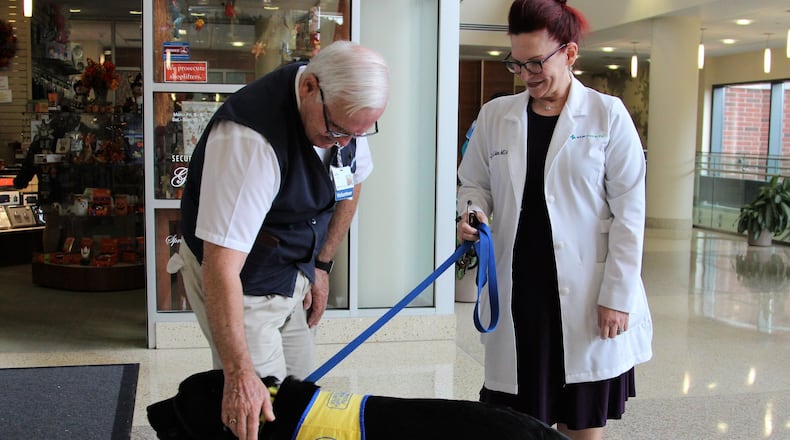“My dad is an animal lover, so is my mother. With Burbank being there, it kind of calmed him, settled him and made him feel at home a little bit more,” Kennedy recalled on Thursday.
Since then, Burbank stops by once or twice a week usually looking for pets. When not sniffing around hospital rooms or jotting down hallways, he can be found resting in the office of his trainer Dr. Lynne Eaton.
“It is good for his exposure and his ongoing career. But I also think that it helps the patients and the staff tremendously,” Eaton said of Burbank’s visits.
LOCAL: Central State students left without dorms, temporary housing assigned
Eaton has been a trainer since 2010 for the non-profit Canine Companions for Independence that pairs service dogs with people with disabilities free of charge. She has been with Burbank for 14-months and he will be leaving her care in November to complete the next stage of the program.
“He will go back to Delaware, Ohio for more advanced training at (the Canine Companions for Independence’s) center there. Then he gets paired with a person with disabilities or a veteran,” she said.
Eaton said around 50 percent of potential service dogs pass the non-profit’s advanced training program. Those that do not make the cut are either placed in a different role or can be adopted back by those that helped raise them.
“Part of you is like don’t pass, don’t pass, don’t pass because I want to adopt you back. But a big part of you is okay I hope you pass because you will go on to better things,” Eaton said.
When Burbank is at the hospital, he often follows Eaton around as she conducts her daily rounds. She joined SRMC in June as a physician specializing in palliative care —which focuses on providing relief to those with life-limiting illnesses— and brought Burbank with her.
When not at the hospital, Burbank plays with Eaton’s three other dogs at home or accompanies her as she visits stores or occasionally dines at restaurants.
MORE: Wright-Patt tops 30K employees for first time in 30 years
Eaton has applied to take in another service dog in training after Burbank leaves. She hopes to continue to greet her patients with a four-legged companion by her side. She said for many of her patients and their families, having a canine around helps them as they transition to hospital life.
“I would always love to have a dog (at SRMC) if I could. They are just such good companions for the patients and the staff too. It just brightens up their day,” Eaton said.
About the Author
